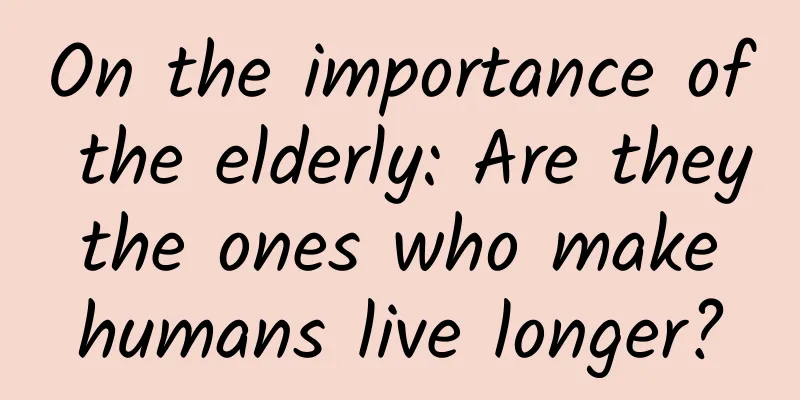On the importance of the elderly: Are they the ones who make humans live longer?

|
As the saying goes, "An old person in the family is like a treasure." To us young people, they were kind, wise and gentle. For a family, they play the role of "think tank" in the home. Surprisingly, they may also be one of the reasons why humans live so long, a new study shows. The related research paper, titled "The importance of elders: Extending Hamilton's force of selection to include intergenerational transfers", has been published in the Proceedings of the National Academy of Sciences (PNAS). (Source: PNAS) It is well known that natural selection, according to long-standing norms in evolutionary biology, is cruelly selfish, favoring traits that help promote an organism's reproductive success. This generally means that the "force" of natural selection often helps organisms avoid the generation of harmful mutations early in life and throughout their reproductive stages. However, once an organism reaches an age where it loses its fertility, this "power" slowly weakens or even disappears, making cells more susceptible to mutation. The even more shameful reality is that the vast majority of animals die shortly after losing their fertility. However, humans and some whale species are different and can live for a long time after losing their reproductive ability. In most animals, including chimpanzees (our closest primate cousins), the link between fertility and longevity is clear, with survival declining in lockstep with reproductive capacity. Human females, however, can live for decades after losing their fertility. "From the perspective of natural selection, long life after menopause is a mystery," said Michael Gurven, a professor of anthropology at the University of California, Santa Barbara (UCSB) and the corresponding author of the paper. “We don’t just live a few extra years, we have a true post-reproductive life stage.” Why is this? One of the leading ideas about human longevity is known as the Grandmother Hypothesis. The idea is that when some women live long enough to become grandmothers to help feed their weaned grandchildren, their daughters can have more children at shorter intervals, and their longevity genes can be passed on to more offspring, who are also more likely to have a longer lifespan. "So it's not reproduction, it's an indirect form of reproduction. For highly social animals like humans, the ability to pool resources rather than just rely on your own efforts can be a game changer," said Raziel Davison, the paper's first author. (Source: UCSB) Of course, the major breakthroughs humans have made in the field of medicine in recent hundreds of years are definitely one of the important reasons for human longevity. In this work, intergenerational transfers, or the sharing of resources between the elderly and the young, are also considered a factor that cannot be ignored, playing an important role in the selection forces at different ages. Food sharing in non-industrial societies is perhaps the most obvious example. Gurven’s studies of the economies and demography of the Tsimané and other indigenous South American groups have found that “from birth, it takes up to 20 years for an individual to produce more food than they consume.” In order for children to be able to take care of themselves and be productive team members, elders needed to obtain and share large quantities of food, meeting much of this demand through the ability to obtain more food than they needed, a provisioning strategy that persisted well into pre-industrial societies and into industrialized societies. "In our model, large amounts of surplus food produced by adults help improve the survival and reproductive capacity of close relatives and other group members who reliably share food," Davison said. The research team found that the surplus (value) provided by the elderly can also produce positive choices that are beneficial to their survival, although this effect will become smaller and smaller as the elderly and young people age. But the importance of elders extends beyond food sharing. In addition to receiving food, children also receive education and socialization, learning relevant skills and worldviews. Here, elders can offer enormous influence: while they may not contribute as much to the food surplus, they have accumulated a lifetime of skills that can be used to ease the childcare burden on young parents and can pass on experience and knowledge to their grandchildren. (Source: Pixabay) “Once you consider that elders are also actively involved in helping others forage for food, then that adds more fitness value to their activities and keeps them alive,” Gurven said. “Not only do elders contribute to the group, their role also helps ensure that they receive surplus, protection and care from the group.” In other words, interdependence goes both ways, from old to young and from young to old. The research team found that rather than longevity bringing opportunities for human-like foraging economies and social behaviors, humans' skill-intensive strategies and long-term investments in group health evolved as humans transitioned to a specific life history (an extended childhood and an unusually long post-reproductive phase). In contrast, chimpanzees can learn to forage by age 5. However, their foraging activities require less skill and they produce smaller surpluses. Even so, if an elder chimpanzee shares more food, they may still generate enough indirect fitness contributions to increase selection power in late adulthood. This suggests that human longevity is actually a story about cooperation. “Chimpanzee grandmothers are rarely observed doing anything for their grandchildren,” Gurven said. “The enormous value of elders is largely unrecognized. It’s time to think seriously about how to reconnect generations and tap into the wisdom and expertise of elders.” Gurven also expressed dissatisfaction with the current situation. "Even though there are more seniors now than ever before, there is still a lot of ageism and contempt for the elderly." "When COVID-19 seemed to be most deadly only to the elderly, many people did not care about the urgency of lockdowns or other major preventive measures." Reference Links: https://www.pnas.org/doi/10.1073/pnas.2200073119 |
<<: Level 10 pain! Is “snake around waist” the residual virus of chickenpox?
>>: Why do mosquitoes taste the water before laying eggs?
Recommend
It doesn’t matter if you don’t have enough budget. We will teach you how to promote for free on a platform with 700 million users.
We all know that how many people can be promoted ...
Can Shuanghuanglian oral liquid inhibit the new coronavirus? ? ?
Late last night, the information that "Chine...
Do you think the Mercedes-Benz GLA's rear seats are too high for your head? Then wait for the Mercedes-Benz GLB
In the compact SUV market, Mercedes-Benz only has...
Ten years after the iPhone, I started watching Apple conferences again
On January 9, 2007, Steve Jobs launched the groun...
Christmas is coming, how to write copy that takes advantage of the situation?
When it comes to copywriting that leverages hot t...
43 years just for a cow?
There is such a cow It was born in the Ulagai gra...
Why choose 400 phone? How does an enterprise apply for a 400 telephone number?
Nowadays, many companies are using 400 telephone ...
3 types of product value make users more willing to buy your product
Many people may think: What value can a product r...
The more you scratch, the more itchy it becomes. The more itchy it becomes, the more you scratch... Where does our "itchiness" come from?
Today we are going to talk about why you itch. Th...
Event promotion: A collection of 54 event cases for the 2019 Spring Festival!
During the Spring Festival, major Internet platfo...
What are the self-media short video publishing platforms? What are the main self-media short videos?
Since 2020, short videos have gradually become po...
4 memory usage issues game developers need to pay attention to
[[151106]] By Aditya Kulkarni From a sales perspe...
How to start promotion from scratch?
From Internet to Mobile Internet At a time when s...
With insufficient hardware innovation, how can Apple “connect everything”?
For some reason, the industry paid special attent...
How does WeChat business promote and attract traffic? What are the effective WeChat business promotion and attracting methods?
Although Wechat business is not as popular as it ...









